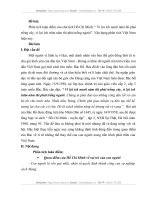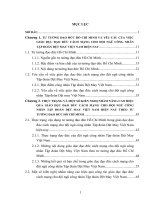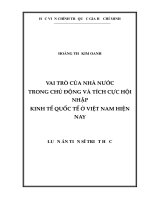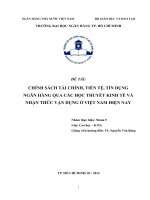PHÂN TÍCH SWOT VIỆC đầu tư FDI RA nước NGOÀI CỦA VIỆT NAM HIỆN NAY e
Bạn đang xem bản rút gọn của tài liệu. Xem và tải ngay bản đầy đủ của tài liệu tại đây (123.24 KB, 16 trang )
PHÂN TÍCH SWOT VIỆC ĐẦU TƯ FDI RA NƯỚC NGOÀI CỦA VIỆT
NAM HIỆN NAY
“Today, there are many Vietnamese companies investing to foreign
countries. However, there is an idea that the government should not
encourage this trend because Vietnam itself is also in need of capital to
improve industrialization and modernization of the country. What
comments do you have about this idea”.
-----------------------------------------------------
CONTENTS
1 /16
Ι.
OVERVIEW OF VIETNAM’S OVERSEA INVESTMENT:
The state of oversea foreign investment of Viet Nam in recent years and expectation
in the near future:
-
According to statistics from the Bureau of Foreign Investment - Ministry of
Planning and Investment (MPI), by the end of 2/2011, Vietnam has had 575
investment projects abroad (outward investment) in 55 countries and regions in the
world with total registered capital of over 23.7 billion USD. In particular, the
capital of Vietnamese enterprises has exceeded 10 billion USD. Vietnamese
companies have gradually made their appearance in some markets in all five
continents, mainly in Asia such as Laos, Cambodia, Singapore, Malaysia and some
countries having the potential for oil such as Algeria, Madagascar, Iraq or the
traditional market of the Russian Federation...
-
Although not as strong as the inflow of foreign investment into Vietnam (in 2010,
the total foreign investment in Vietnam is 192, 92 billion USD with over 10,000
projects), the outflow capital of Vietnames enterprises to oversea has somewhat
shown their efforts in seeking new business opportunities outside the borders.
-
Combined from the reports of the investors, the total implemented capital of
outward investment projects of Vietnam in 2010 was about 900 million USD.
These include sectors such as:
o Mining reached over 700 million USD;
o Agriculture, forestry and aquatic products reached 70 million USD;
o Retail and wholesale distribution reached 53 million USD;
o Telecommunications reach 33 million USD;
o Electricity generation reached 25 million USD...
-
The Bureau of Foreign Investment reported that the investment activities abroad in
2010 continued to focus on the sectors and areas which was prioritized to promote
investment oversea; those are the sectors that Vietnam is currently in need, such as
minerals mining, cash crops and boost export of Vietnam to the outside,
telecommunications, aviation; banking...
-
However, most of the large-scaled investment projects are still in the early stages of
the investment process, therefore, their profitability is not considerable and there is
2 /16
no significant contribution to economic development in the country. Thus, the
investment abroad activities of Vietnam now and in the future should be controlled
to regulate the flow of money in and out, to ensure macro-economic balance and
economic stability.
-
According to expectations, foreign investment capital in 2011 increased by about
1.5 to 2 billion USD, in which the leading group was 5 large corporations:
Petrolimex, Coal - Mining Industry, Rubber Industry, Viettel, Song Da Corporation
which account for 67% of the funds of economics sectors transferred to outside to
invest.
(Source: The Bureau of Foreign Investment, The Ministry of Planning and Investment).
-
It can be said that the outward investment activities of Vietnamese enterprises have
achieved initial achievements and contributed to the development of the country;
the outward investment activities are and will be considered as an important means
to gain autonomy in the process of international economic integration. These
activity are to transfer comparatively advantageous resources inside the country to
the outside to create competitive advantage, improve production capacity; find
alternative resources, reduce environmental pollution in the country; expand
markets and boost economic structure adjustment and allocate resources in wider
area. Besides, overseas investments will also contribute to enhancing resources for
sustainable economic development to obtain the best interests of the country.
-
However, in the context of Vietnam at present and in future years, the outward
investment activities still need to be controlled by the State to ensure that those
activities have focal points, head into a right direction and can achieve the best
results.
-
Currently, the legal system and policies about outward investment has been further
refined to create an open legal environment in order to provide favorable conditions
for companies conducting investment overseas. MPI identified that the
management of the government towards overseas investment activities must be
strengthened to ensure the proper investment and effective direction. Overseas
investment need to be considered as an integral part in strategic planning, economic
and social development plan in general as well as each region and locality in
particular in order to adjust the orientation of institutions and policies, market
3 /16
direction, investment partners; to ensure balanced and realistic implementation;
avoid wasting resources.
-
Vietnam has become a member of WTO. This is considered a favorable condition
for Vietnam to expand its market into other countries and gradually perfect the
legal system to be more consistent with the general development trend of the world
economy. The economic experts warned that Vietnam should strengthen the
management of government-based outward investment capital flows, ensuring that
state funds are used in a public, transparent and efficient way. This is particularly
important when the majority of investment projects of Vietnam to other countries
mainly use this source of fund .
-
The system of regulations and policies of Vietnam towards oversea direct
investment activities is gradually being improved, creating the legal framework for
the operation and management of direct investment abroad.
ΙΙ.
SWOT ANALYSIS OF CURRENT OVERSEA FDI INVESTMENT OF
VIETNAM:
Strengths:
1)
-
Vietnam has good relations with neighboring countries such as Laos and
Cambodia. These two are also the largest invested market of Vietnam today;
-
Regulation system and policies are gradually being completed;
-
Outward direct investment activities are growing relatively fast and wide;
-
Some major projects have started to be implemented;
-
Direct investment abroad is becoming a trend in Vietnam;
-
Investment in a variety of field and in different scales, including nations and
territories;
-
Forming a business class with bravery and determination “to enter foreign
nations”.
Weaknesses:
2)
-
The management system of the government is still heavy with complicated and
costly procedures;
-
There haven’t been any strategies and policies to encourage direct investment
abroad;
4 /16
-
Activities are spontaneous, not organized;
-
Vietnamese investors are generally not strong in terms of capital, technology
and experience.
-
Investment information is still extremely limited.
Opportunities:
3)
-
Direct investment abroad is becoming an inevitable trend;
-
Globalization has created an environment for investment activities to develop;
-
Vietnam joined the WTO and signed several bilateral and multilateral
investment agreements;
-
Other countries’ need to attract FDI is increasing, especially during the coming
post-crisis period.
-
Investing abroad will help Vietnamese companies expand their market.
-
Investing abroad will be the driving force for companies to explore, develop
and perfect themselves to adapt better with the new business environment, adapt
to larger scale and more complex operations, and to better compete.
Threats:
4)
-
Competition in investment is increasing, particularly in neighboring countries
such as China, Thailand, Singapore, …;
-
Political - economic - social situation is unstable in many countries, leading to
investment risks;
-
The investment environment in some countries is incomplete;
-
Investment opportunities in potentially lucrative sectors such as mining,
telecommunications ... are decreasing due to the increasingly fierce competition.
-
The starting point and the level of development of the domestic economy is
still too low, there are also the effects of financial and monetary crises, the
centralized bureaucratic system still create negative influence…
-
Misconception when thinking that outward direct investment should only be
implemented when the economy has surplus capital. One-sided thinking, or
thinking that increaseing direct investment abroad will reduce domestic
investment, lose foreign currencies, reducing employment in the country…
5 /16
-
Financial capability and experience in international investment is still weak,
general competitiveness of companies is still at the low level... which keeps the
ability of carrying out direct investments abroad at an insufficent level.
-
The legal system has changed, but not yet created incentives for companies to
directly invest abroad: The process of investment evaluation and registration is
very slow which spans through many stages and lacks specific regulations and
sanctions; time-wasting and cumbersome procedures can not encourage
businesses to invest directly abroad or making companies lose business
opportunities.
-
Companie’s source of investment capital to overseas is limited. (According to
Article 9 of Decree 78, an investment project in the field of banking, insurance
business, finance, credit, newspapers, radio, television, telecommunications using
state capital from 150 billion or capital from economic sectors of 300 billion or
more has to be approved by the prime minister; ...
-
There is no specilized department in charge of oversea direct investment; the
coordination between the agencies of the Government (Ministry of Planning and
Investment, State Bank of Vietnam, Ministry of Finance) in the management of
investment projects abroad is limited; field survey teams haven’t been
established to deeply assess the effeciency of oversea investment activities. The
relationship between diplomatic representative agency, the Commercial office
of Vietnam in foreign countries with enterprises investing abroad is still not
close enough, therefore, when disputes occur , the company will not be able to
take advantage of the support from the State.
-
There hasn’t been an internationally connected website and professional
consulting organizations on both national and global levels to provide
investment supporting services in foreign countries, such as: providing market
information; partners information, business opportunities and experience,
information about the investment environment; trade promotion services; legal
assistance services on registration and handling trademark disputes, accounting
consultancy, tax...
-
The participation of Vietnam in WTO, in theory, is to help companies to easily
access the markets through bilateral and multilateral agreements which Vietnam
6 /16
has signed. But in reality, Vietnam still has no direct legal relationships
necessary to implement the activities of favorable bilateral direct investment
according to the standards and principles of current international practice; there
are many organizations and legal regimes of international business which
Vietnam is not yet a member, even the necessary legal policies and strategies to
navigate and support entrepreneurs in investing abroad are still inadequate,
inconsistent and unspecific ... That means we are facing an urgent need to
quickly "fill" in the legap "gaps" of the country to create a more "homogeneous"
investment environment according to the demand of growth in the market
economy and international economic integration. It is necessary to affirm that
the need to invest abroad is objective and growing, so if not being guided and
protected by the government regulations, there will be more "illegal investment",
spontaneous and risky activities...
ΙΙΙ.
THE TOOLS AND POLICIES OF THE GOVERNMENT TOWARDS
OVERSEA FDI INVESTMENT OF VIETNAM IN RECENT YEARS:
1.
Tools applied by the government from 1989 up till now:
-
In 1989, Vietnam began conducting overseas investment with only a project
between a Vietnamese partner and a Japan partner with the registered capital of
563,380 USD. But it can be said that it was this project that paved the way for
outward investment activities in Vietnam.
-
On 14/4/1999, the Government issued Decree No. 22/1999/ND-CP of regulations
on outward investment activities. In fact, in the early years, overseas investments
are small and fragmented, hence the number of newly approved projects as well as
the registered capital is insignificant. However, until the 2006 – 2010 period, the
number and scale of outward investment activities started to increase greatly,
especially after the government issued new decrees.
-
Decree 78/2006/ND-CP dated 09/08/2006 of regulations on direct investment
abroad was issued by the government to replace the previous Decree 22/1999/NDCP. Decree 78/2006/ND-CP amending and supplementing the provisions of
encouraging, prohibiting, restricting investment to foreign countries; investment
incentives; the term of project implementation; governmental management of
7 /16
direct investment abroad in which clearly defining the responsibilities of the
related ministries and agencies and provincial People's Committees; 113
provisions on assisting investors in foreign countries. Investment approval period
is shortened, to only 15 days from 30 days before. Capital of investment projects
under the approval of the Prime Minister is also much larger.
Specifically, projects in the fields of banking, insurance, finance, credit,
newspapers, radio, television, telecommunications using state capital from 150
billion Vietnam dong or more, or using capital from other economic sectors of 300
billion Vietnam dong or more; or projects of other sectors that use state capital
from 300 billion Vietnam dong or more or using the capital of other economic
sectors of 600 billion Vietnam dong or more will need to be approved by the
Prime Minister.
-
Decree No. 121/2007/ND-CP dated 25/7/2007 in overseas investment in petroleum
activities, and Decree No. 17/2009/ND-CP dated 16/2/1009 of Government on
amending and supplementing some articles of Decree 121.
-
Circular No. 97/2002/TT-BTC of preferential tax policies for enterprises to invest
abroad: Machinery, equipment, supplies, materials ... export to foreign countries to
create fixed assets for investment projects of enterprises will be exempt from
export tax and will apply the VAT tax rate of 0%. Revenues of Vietnam enterprises
investing abroad, if already deducted the income tax of that foreign country , will
not be deducted that amount when calculating tax to submit in Vietnam . The income tax
of these companies, if already been exempted or reduced under the laws of the
host country (for the profits earned from the project), will also be deducted when
determining the tax in Vietnam
-
The agreements, protocols, agreements, domestic and international legal
regulations directly or indirectly related to investments, flow of goods, services and
labor across borders: So far, Vietnam has signed about 90 agreements and 47
bilateral trade treaty in investment protection.
Overseas direct investment activities have more or less presented the strength of
not only the economy of Vietnam but also of politics, creating good relationships
with invested countries, thereby improving national prestige on the international
stage. The implementation of direct investment abroad helps businesses in
8 /16
Vietnam use capital more efficiently; the financial capibility of the business is
guaranteed; therefore ensure to carry out completely the financial obligations and
contributed significantly into the state budget, increasing funding of national
economic development.
2.
Oversea investment is inevitable:
“The goal of the Industrialization - Modernization process is to build our nation
to be an industrialized country with modern facilicites, appropriate economic structure,
good production relations; in accordance with the development level of manufacturing
forces; high physical and mental living standards; secure defense system; rich citizens,
strong country and an equitable and civilized society”.
To achieve the country’s goals of modernization and industrialization, in addition
to having capital to implement, businesses need many other prerequisites to be
successful. Overseas investment can help businesses get the opportunity:
a) Familiarize and adapt to the world market.
Direct investment abroad not only contributes to promote investment activities of
Vietnam, but also helps enterprises to penetrate world markets and seek profits. This is
very important for companies to be confident and also proactive in accepting the
openness of the domestic market.
Besides, enterprises also have the opportunity to learn many lessons in direct
investment abroad and how to survive in the world economy, creating momentum and
confidence among domestic firms to unite and bring about the victory in the
competition in marketplace.
Direct investment abroad is an area containing many challenges, but it’s also a
great opportunity if businesses know how to embrace it to create new possibilities for
the economy.
b) Access the advancement of science and technology.
In this era of booming science and information technology, direct investment
abroad is one of the methods that businesses in developing countries can apply to
access high-tech science, learn and apply the application of information technology.
Today, science and information technology is changing and developing every
minute, its application has a crucial role in the economy and in most areas of life. When
making direct investments abroad in countries with advanced science and high
9 /16
technology development, Vietnam has the opportunity to make direct contact with the
application of science and technology in these countries. Besides, Vietnam enterprises
have the opportunity to bring the scientific advances of high technology, which can not
be applied domestically, to invest directly abroad, creating new competitive products
and market in the developed countries.
c) Risk sharing in investment and business.
One of the methods to share and avoid risks is to make direct investments
abroad, diversify the portfolio to acquire profit, consolidate sustainable and stable
operations and the development of enterprises, and avoid the risk of inflation, exchange
rate... On the other hand, direct investment abroad also generate revenues in foreign
currency for enterprises, contributing in increasing the country's pool of foreign
currency, setting a stable balance of payments and good development trend.
d) Creating favorable conditions for companies to transform production structure,
enhance the competitiveness of the enterprises.
Direct investment abroad helps enterprises transform production strucutre and
create conditions for the application of new production technologies, enhance the
dynamism and competitiveness of enterprises.
e) Helping companies promote their advantages.
Each business has its own strengths and advantages, direct investment abroad
will help companies maximize those advantages to promote the strengths of company’s
products, especially traditional products exclusively from that country.
Ις.
SOLUTIONS
TO
PROMOTE
OVERSEA
DIRECT
INVESTMENT
OPERATIONS OF VIETNAMESE COMPANIES:
1) There is a need to “change the awareness” of all government agencies in all
levels and the companies themselves and Vietnamese businessmen in oversea
direct investment.
Nowadays, there are still many people who think that since Vietnam is a
developing country so we just need to care about the inflow of capital into the
economy, but show very little concern in the outflow capital, especially companies’
direct investment flows to foreign countries. This is a partial perspective, because of the
fact that the more one country directly investes aborad, the higher the chance for that
10 /16
country to expand business cooperation and attract more foreign investment ... Hence,
we need to change the perceptions of all levels of governmental agencies, enterprises ...
in terms of direct investment abroad:
-
Improving the expertise of officers in the field of direct investment abroad, to
propagate and explain to companies so that they can see many benefits of direct
investment abroad activities.
-
Develop a list of encouraged projects to directly invest abroad with the specific
preferential credit, tax policies and mechanisms ... It’s necessary to be specific in
stead of being general, such as just naming a list of projects...
-
Decentralization of decision authority to approve direct investment abroad in the
direction that can give more power to localities to shorten the waiting period for
investment approval.
2) Improve the competitiveness of Vietnamese companies.
α. From the Government:
-
Consider carefully when choosing incentives and support policies in the form of
subsidies or protection and if so, determining the time and reasonable approach.
It’s necessary to focus on developing policies to facilitate production, business,
create the right environment, autonomy and transparency of business activities.
-
Quickly proceed to eliminate difficulties and obstacles which impede the normal
operation of the business in general, focusing on the following:
o Overcome the lack of inconsistency, asynchronous, overlapping and
contradictions in the policies and implementation in different levels and
industries. So far, there are still unpredictable changes in policies which
create difficulties when determining the business strategy, transform profit
into loss or create risks in investment.
o The financial, tax, credit ... sectors are not renovated in which the
implementation process is still troublesome.
o The non-economic intervention directly affects the performance of the
enterprise. To deal with that situation, companies have to wriggle, avoid or
being unhonest to cover costs incurred. To overcome this situation, it’s need
11 /16
to continue thorough and intensive administrative reform which is conducted
in a synchronous and resolute manner.
o Gradually reducing the price of governmental goods and services, stablizing
the prices of input goods which can affect the production costs such as
electricity, water, telecommunications, energy, transport charges, ports
service charges, airports and administrative services fee.
β. From the Company:
-
Continue to transfer ownership, restructuring by many methods: equitization, sale,
lease or dissolution. It’s also needed to determine the scope and specific criteria for
enterprises with 100% state capital, state holding controlling shares.
-
Building economic and technical cooperation between state enterprises and
enterprises of all other economic parts to promote and exploit the advantages,
overcome shortcomings in the international economic integration.
-
Develop business strategy, product strategy, brand ... gradually improve the
management capacity of enterprises. In addition, businesses should invest in
research and developing new product, innovating technology and applying advance
quality management system.
-
Improve productivity; associate product quality with cost cutting in order to reduce
costs, increase product quality by many methods is one of the factors "deciding" the
competitiveness of each company.
-
Innovate management organization, apply advanced management methods,
enhance modern business skills, the ability to approach and develop markets, sales
ability …
In order to do all these, it’s necessary to have a training route, to attract and use
talents in business. The manegement team of the company needs to be really
professional and have adequate skills and qualifications to integrate with the world
markets. They not only can enrich themselves, but also care about the community
benefits
3) Continue to complete the system of policies and processes in oversea direct
investment:
12 /16
-
Accelerate the evaluation and approval process for investment projects abroad,
reduce the administrative procedures, adjust the procedures of investment approval:
Online registration, minimize the approving time.
-
Develop a list of especially encouraged projects and promote direct investment
abroad with the appropriate form of preferential credit, foreign currency
purchasing, tax ... develop a project on the mechanisms in supporting to enhance
investment activities abroad.
4) Enhance the activities to support enterprises in investing abroad.
The supporting towards Vietnamese entrepreneurs and businesses in investing
abroad can not be performed spontaneously, temporarily or assigned totally to a few
agencies, organizations or individuals; instead, it should be directed in a focused,
unified and continous way with the coordination, compatibility of a system of
organizational structure, levels, offices, units and individuals concerned:
-
There should be inter-sectoral and specialized agency, along with qualified and
responsible staff to be in charge of governmental management of investment
activities abroad; these organizations and people should also have the responsibility
and authority necessary to study and propose to build, adjust and approve the
documents and legal provisions directly related to these activities.
-
Vietnamese embassies, consulates and Chambers of Commerce in foreign countries
should facilitate at the maximum level, comprehensively support Vietnamese
entrepreneurs and companies operating in the country or territory that they are
being in charge of, especially in providing support for passports, visas, support the
security of property and personal safety, support in terms of procedures and even
the legal guarantees, ask the host country to allow the establishment of business
associations, trade centers, the combined corporate and businesses of Vietnamese
enterprises in the appropriate places in the country, local territories.
-
The state-owned commercial banks of Vietnam should have branches or
representative offices abroad which better be set at the community center with
many large Vietnamese businesses and enterprises or in large financial center to
offer direct payment services, money transfer and guarantees necessary for the
operation of Vietnam's investment abroad.
13 /16
-
Need to study and establish financial investment companies which can raise capital
in and out of the country to carry out international financial investment, so that we
can diversify overseas investment tools of Vietnamese entrepreneurs and
companies.
-
Encourage and support the establishment of Vietnam business associations in each
country, the industry associations based in the country with many branches and
representative offices in foreign countries; actively participate in regional and
international associations.
-
The government need to organize the hotlines, regular and irregular meetings
between the government – Vietnamese entrepreneurs and enterprises – foreign
embassies, consulates, Chambers of Commerce in Vietnam and Vietnamese
embassies, consulates, Chambers of Commerce in potential market or where there
are many Vietnamese businessmen and companies operating ... to capture and
quickly handle the demand, urgent matters set forth in the investment activities
abroad of Vietnamese entrepreneurs and enterprises.
-
The protection and legal support of the state to establish trade and economic center
of Vietnamese in foreign countries, especially in the market which we have
developed, new and traditional markets (U.S., Japan, Germany, Russia and some
Latin American countries, including in Africa) are and will continue to be an
important direction to enhance and improve the efficiency of the direct investment
of Vietnam in foreign countries.
-
Issue specific regulations of incentives, supporting policies towards Vietnamese
companies directly investing abroad; organize programs to promote direct
investment abroad combined with investment into Vietnam; continue building and
completing the project of mechanisms in encouraging and promoting investment
activities abroad in 2007-2010 under the direction of the Prime Minister (to
encourage Vietnamese enterprises to directly invest abroad in the fields and
industries that Vietnam wants to exploit raw materials and transfer abroad such as
textile, garment and footwear... )
5) Enhance the expansion of international cooperation in FDI.
-
Signing the bilateral and multilateral investment agreements. Currently, Vietnam
has signed some multilateral investment agreements such as the agreement on
14 /16
investment measures related to trade (TRIM), the Agreement on trade issues related
to intellectual property rights, along with some regulations on FDI, we need to
continue participating in multilateral agreements to remove barriers for Vietnamese
businesses when investing abroad.
-
Besides, we need to actively promote the signing of investment agreements with
each specific country. Currently Vietnam has signed agreements with some key
partners. The signing of the bilateral agreements will protect Vietnamese
companies when investing in the country that we have the agreements with, as well
as increace the chance of profitability when implementing projects in foreign
countries.
-
To actively negotiate about agreements to avoid double taxation and improve the
effectiveness of the agreements already signed. With the following specific
measures:
o Clearly identify the countries that we need the signed agreement: Focus on
countries already have economic – investment cooperation with Vietnam, or
have the potential to thrive in the future.
o Improve the professional qualifications of officials involved in negotiations.
Negotiation participants must clearly understand the agreement forms, the terms
and legal aspects. They should also understand about the economic and
investment relations between the two countries...
o Strengthen the implementation of agreements already signed. Improving the
capability of the management team and implementation of the agreement,
promptly issue documents to guide the implementation process of signed
agreements. At the same time, enhance information exchange between Vietnam
and the countries participating in the agreement to improve the efficiency of the
implementation of the Agreement. Additionaly, propagate to businesses to help
them understand about the double taxation avoidance agreements so that they
have the opportunity to take advantage of signed incentives.
ς.
CONCLUSIONS:
15 /16
Direct investment abroad has a two-sided nature, on one hand, it helps
Vietnamese enterprises have the opportunity to expand business in international
markets, approaching modern science, open new markets, have chances to study and
apply local research into practice ... However, if not controlled properly, direct
investment abroad will make Vietnam's capital leak into international markets in the
context that the domestic economy desperately needs to be invested; excessive labour
force, lack of jobs in Vietnam when the companies are trying to solve unemployment
for the invested countries.
Therefore, with a country just stepping into a middle-income threshold like
Vietnam, it’s very important to balance resources to create fast and stable growth.
Investment abroad is an inevitable trend, but is effective only when the investment flow
is directed and effectively used.
16 /16









